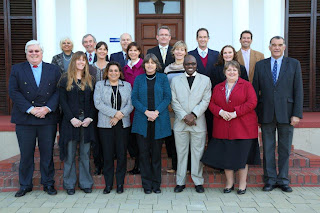Herschel, apart from being actively controlled and run by a body of teachers, prefects, students and other staff, is an institution that has been propelled forward to success by a more “invisible force”: The school’s Trust and Council.
It is this constantly altering yet unwaveringly steadfast collection of individuals that are responsible for every major decision and undertaking that Herschel, as a school, does or does not undertake (For example, the development of “The Field” in 2011).
The Herschel council consists of fourteen members, all of which are volunteers constituting from a diversity of expertise and backgrounds -thus giving ,what could be labelled as the figurative “backbone” of the school the all-round awareness and knowledge that it needs in order to function as efficiently and effectively as is possible. These individuals- a range of lawyers, architects and/or educationalists- are not paid for the work and time they offer the school but instead, exercise their many roles as council members out of a loyalty to and a love for Herschel Girls’ School. However, in order to ensure that the school is always run by an ‘un-tainted’, fresh perspective, after each council member has exceeded their limited period of service a new member is selected to replace them.
 |
| The Herschel Council 2012 |
It is thus true to recognise that the council, and ultimately the school in the wake of its decision making, is only as strong as its weakest link, which, up until the present day, has been a negligible hindrance of success within Herschel School.
The Herschel council consists of different subsections that are each responsible for the extension and development of the various aspects of which the school consists. These subsections are, namely; Outreach, Human Resources, Marketing, Bursaries, Planning, ICT, Spiritual, Educom, Old Herschelians and Finance.
All the planning and setting of ‘long term’ goals that is done by the council is essentially derived at the ‘Strategic Planning Meeting’ held once every two years. During this meeting all the staff, management and council assemble to critically discuss how and where to improve upon the school as an institution by re-addressing Herschel’s various aims- in co-operation with feedback received from old girls, parents, universities and educationalists. For example, Herschel’s ethos of striving to give its pupils a well-rounded education that prepares them for life is an aim executed in congruency with the discussions of the Strategic Planning Meetings.
The next stage that is necessary in order for the aims of the council to be strategically achieved is that the conclusions made at the meeting are put forward to the quarter-annual council meetings in which the decision making body of the school finalises and officialises execution plans.
One of the major changes in Herschel regarding the council and budgeting was the change to a non-profit company under the Companies Act. Luckily there did not have to be a major change in the structure to adhere to the new requirements as Herschel had already been following a similar format. This means that all the money made is fed directly back in to the running, sustaining of and regenerating the facilities of Herschel.
The Council is also accountable for the budgeting of Herschel which has operated so far without the aid of outside borrowings as well as no state subsidies since 2000. Over the years Herschel has depended exclusively on their own income for funding costs and expenses.
Budgeting procedures have to be based on many changing social factors as well as the continually fluctuating economy. The school fees are the main source of income and other funds come in the form of donations and administration fees. The fee increase or decrease is calculated by the expected number of pupils. Efficient monitoring of costs, almost full classes and professional and judicious financial management enable the school to improve facilities and attract the best staff. The money allocated towards salaries is decided on by reviewing current payrolls and market-related increases. The Council has to budget carefully in order to meet anticipated costs and to capitalize on the funds obtained in the year. It has been under the guidance and decision making of the Council that has transformed the school as seen in these two contrasting photographs.
Reference List:
· Herschel Girls School (1972). The Stars Looked Down. Cape Town: Margaret Saffery.
· Interview with Mr Ramsbottom on 12/11/2012.
· Madeleen Welman (Editor) (2011). The Herschilian . Cape Town: Ramsaymedia
for Herschel (Neal Farrell).
for Herschel (Neal Farrell).
· Herschel Girls School (1991). The Herschilian . Cape Town: Associates of Herschel Girls
School
Authored by:
Julia Hampton and Julia Unite.
School




No comments:
Post a Comment